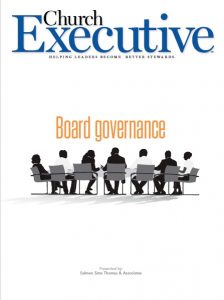
But before you commit, review 3 important items — or face a load of liabilities
By Rebecca M. DaVee, CPA
 It’s always great to be approached to serve on your church’s board … or is it?
It’s always great to be approached to serve on your church’s board … or is it?
Whether yours is a 70-, 700- or 7,000-member church, there should be a transition system in place to onboard new board members. These highly valued volunteers are taking on significant fiduciary roles that could precipitate financial liabilities for employee negligence.
#1: The first question a new board member should ask is, “May I see a copy of the church’s director and officer (D&O) insurance policy?”
D&O coverage protects the board and / or the church for losses incurred because of a legal claim filed against a board member. These claims can be for either perceived or actual wrongful acts committed during the board member’s service to the church.
 What? Are you saying that board members can be sued? Absolutely!
What? Are you saying that board members can be sued? Absolutely!
Board members can be sued for failure to protect certain trust / agency funds of the church, including failure to remit employee withholdings and certain other taxes. The board is ultimately responsible to the stakeholders of your church — not stockholders, but stakeholders:
• Employees / contractors and volunteers
• Donors
• Vendors, creditors and suppliers
• The community of service.
Your board is responsible for following the regulations and best practices to protect every stakeholder so that the mission is protected and the church’s tax-exempt status is preserved.
#2: Preserve. Protect. Best Practices.
Your board is responsible for complying with its bylaws which define how the board will operate and conduct corporate business. These bylaws, or rules of governance, explain how the board performs its job in managing the mission and activities of the church.
“Good governance” boils down to three critical words, as defined by trust law:
CARE LOYALTY OBEDIENCE
These words define the fiduciary responses whereby each corporate action is measured. We call them duties.
Duty of Care — requires board members to act toward others and the public with the sharp-eyed attention, caution and prudence that a reasonable person in similar circumstances would act. If a board member’s action do not meet this standard, the acts are considered negligent, and any damages resulting might be assessed in a legal claim against the church.
Duty of Loyalty — requires board members to act at all times in the best interest of the church. Loyalty imposes the responsibility to avoid possible conflicts of interest, thereby precluding self-dealing or taking advantage of a business opportunity for personal gain. Violation of this fiduciary responsibility could expose the board member to a court order to pay restitution and stiff fines.
Duty of Obedience — requires board members to remain faithful to and pursue the goals of the church. This standard requires the board member to follow the governing documents of the organization, laws applicable to the organization, and restrictions imposed by donors. This ensures that the church seeks to satisfy all reporting and regulatory requirements. In short, duty of obedience ensures that the church’s mission is protected and that charitable assets are not diverted to non-charitable uses.
Make sure your church’s bylaws have been reviewed and comply with current state law. Ask your corporate attorney to review your governing documents to make sure they comply with current state regulations.
 #3: I encourage all new board members to request a copy of the church’s conflict of interest policy.
#3: I encourage all new board members to request a copy of the church’s conflict of interest policy.
This policy defines how the board / church will respond if a potential conflict is identified or disclosed. Transactions affecting relationships always serve at the center of a potential conflict between the church and a third party. These third parties (individuals or businesses) are typically connected through a board member or a stakeholder.
Make sure the church’s policy:
• Defines the term conflict of interest
• Provides instructions for board members and key staff to follow when disclosing real or perceived conflicts
• Outlines the steps the board and executive team will follow upon disclosure of conflict.
According to Christianity Today, only 1 in 6 churches have a conflict-of-interest policy. Yikes!
Furthermore, there typically isn’t an annual process in place for confirming current relationships or activities that could identify potential conflicts connected to

ministry activities.
When a potential conflict is discovered, or situations arise that point to a perceived conflict, Richard Hammer J.D. / CPA recommends the board:
• Exclude. All parties with the conflict should be excluded from the discussion and the vote related to approving the transaction. This is called “recusing” these members.
• Compare. Obtain reliable analogous information regarding terms of the transaction from appropriate independent sources, such as competitive bids, independent appraisals or expert opinion.
• Determine. Is this transaction in the best interest of the church? Could it be misperceived by your stakeholders?
• Document. Document. Document. Contemporaneously document items included in the above!
Rebecca M. DaVee, CPA, is a partner with Salmon Sims Thomas & Associates in Dallas. She has been working with churches, ministries, televangelists and other tax-exempt organizations
for more than 30 years.


